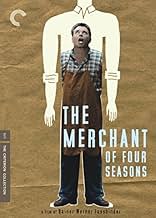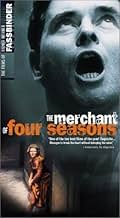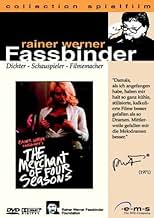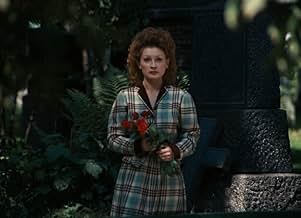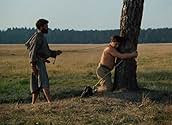IMDb-BEWERTUNG
7,3/10
5535
IHRE BEWERTUNG
Hans Epp ist ein selbstzerstörerischer Mann, der ein unzufriedenes Leben führt. Er versucht, als Obstverkäufer einen Sinn zu finden, aber ein Herzinfarkt behindert seine Arbeitsfähigkeit.Hans Epp ist ein selbstzerstörerischer Mann, der ein unzufriedenes Leben führt. Er versucht, als Obstverkäufer einen Sinn zu finden, aber ein Herzinfarkt behindert seine Arbeitsfähigkeit.Hans Epp ist ein selbstzerstörerischer Mann, der ein unzufriedenes Leben führt. Er versucht, als Obstverkäufer einen Sinn zu finden, aber ein Herzinfarkt behindert seine Arbeitsfähigkeit.
- Regie
- Drehbuch
- Hauptbesetzung
- Auszeichnungen
- 3 Gewinne & 5 Nominierungen insgesamt
Walter Sedlmayr
- Fruit cart salesman
- (as Walther Sedlmayer)
El Hedi ben Salem
- The Arab
- (as Salem El Heïdi)
Empfohlene Bewertungen
What kind I say about this movie. well for starters, I thought that this film was okay, not the greatest not worst. I said this cause I thought that the script was great and original, really different and refreshing. Now I wouldn't say that it's the greatest film that I've seeing cause of the acting. The actors that played each role, seems that they played them without emotions, as if they took the life out of them. When the wife laughed or cried, this didn't look real to me for some reason, that's just an example, but sincerely all the characters didn't act real at all. I wish I could say more positive things about this film so you guys can see it at least once but how can I do that since I know that I'm not going to see this movie again. I rented this film from the library of my school, without hearing anything about the film itself or the director. I took a chance because the story that was describe on the back sounded really interesting and it really was.
If I squint, I can see the influence of Douglas Sirk on this Rainer Werner Fassbinder soaper about fruitseller Hans Hirschmüller. He's cast as a failure, because he doesn't live up to the middle-class aspirations of his family. He runs away and joins the Foreign Legion. He returns and joins the police, but is kicked out for consorting with a prostitute. His one true love can't marry him because of his work, although she meets him for assignations. In between, he has a shrewish wife in Irm Hermann, in-laws who despise him, a heart attack, and his gradual erasure from his own life to contend with.
However, while Sirk's most famous work in the 1950s tinges his disapproval of the post-war middle class with sympathy and wonderment at peoples' refusal to admit what they want to to be happy, Fassbinder seems angry and contemptuous of his subjects. Hirschmüller is too passive, Miss Miss Hermann plays the victim card too aggressively, his family arrant, mealy-mouthed snobs, and so forth. There's no one to root for in this. There's nothing tragic about his inevitable destruction, only a sadistic, scolding examination of all that Fassbinder finds wrong with mainstream society.
However, while Sirk's most famous work in the 1950s tinges his disapproval of the post-war middle class with sympathy and wonderment at peoples' refusal to admit what they want to to be happy, Fassbinder seems angry and contemptuous of his subjects. Hirschmüller is too passive, Miss Miss Hermann plays the victim card too aggressively, his family arrant, mealy-mouthed snobs, and so forth. There's no one to root for in this. There's nothing tragic about his inevitable destruction, only a sadistic, scolding examination of all that Fassbinder finds wrong with mainstream society.
I didn't find this film as accessible as 'Fox & his Friends' but it was a moving portrayal of a typical Fassbinder victim figure, the eponymous barrow-boy, Hans Epp, whose hopes and dreams are eventually crushed by stultifying conformity (family & society). Some of the scenes are exaggerated (the family confrontations) but I particularly liked the sequence where Hans is desperately searching for meaning & comfort; he tries to find some peace in natural surroundings, goes back to his first lost love in order to recapture past feelings (she's only interested in a quick fling before her husband returns) and visits his sister, perhaps the only person who has any degree of sympathy for him, only to find she's too busy with work.
A poignant story of a vulnerable inarticulate man crushed by his mundane surroundings and bourgeoise, middle-class German values obsessed with economic success and a upward mobility that conveniently papers over the cracks of its more disturbing past.
A poignant story of a vulnerable inarticulate man crushed by his mundane surroundings and bourgeoise, middle-class German values obsessed with economic success and a upward mobility that conveniently papers over the cracks of its more disturbing past.
The Merchant of Four Seasons is a film about a lack of love. The film starts off with the main character; Hans Epp, returning from a spell in the foreign legion. He returns to his mother, not to be told how much she loves him, or how much she's missed him; but to be told that he is worthless and, even worse, that she would have preferred the man he went with to have come back instead. It is the character's relation to women that makes this film so hateful; the fact that his wife is taller than him is symbolic of his relation to the other gender; he is consistently humiliated by them, and it is through his relations with them that his life isn't as great as it could have been. This is also shown clearly by the way he treats his wife after a drink. He lost his job as a policeman through lust for a woman, and even his wife; a woman that is supposed to love him, never really shows any affection for him. Even at the end, his wife is more bothered about what her and her daughter will do than the state of her husband.
The Merchant of Four Seasons is a thoroughly unpleasant film. There isn't a scene in the movie where someone is happy, and not only that; but the movie seems deliriously blissful to wallow in the misery of it's central characters. The movie is certainly not recommended to anyone who is currently having a hard time, that's for sure. Despite all the misery, the film never steps out the bounds of reality; every event in this movie can - and most probably has - happened, and that only serves in making the movie more shocking. The film is, of course, helmed by Rainer Werner Fassbinder; the cult German director that committed suicide in 1982. This is only my second taste of the man's work, but through just two films, it is easy to get an idea of the type of art that he creates. Both films are downtrodden and gritty - yet realistic pieces of art. His characterization in this movie is subtle; we only ever get to know the characters through their plight's and not through their character. This is a very clever way of showing the audience that it is their surroundings that define the people in the film, not the people themselves - and as nearly everyone that sees the film knows what living in an urban society is like, it wont difficult for the majority of people to relate to.
The Merchant of Four Seasons is not a film that is easily forgettable; the movie is high on substance and low on style, and that makes for a very memorable picture, and one that everyone who considers themselves to be a fan of cinema should experience. It is with that in my mind that I give this film my highest recommendations; it's not sweet and it's not pleasant, but you will not see a more realistic portrayal of depression, and this is most certainly a movie that will stay with you.
The Merchant of Four Seasons is a thoroughly unpleasant film. There isn't a scene in the movie where someone is happy, and not only that; but the movie seems deliriously blissful to wallow in the misery of it's central characters. The movie is certainly not recommended to anyone who is currently having a hard time, that's for sure. Despite all the misery, the film never steps out the bounds of reality; every event in this movie can - and most probably has - happened, and that only serves in making the movie more shocking. The film is, of course, helmed by Rainer Werner Fassbinder; the cult German director that committed suicide in 1982. This is only my second taste of the man's work, but through just two films, it is easy to get an idea of the type of art that he creates. Both films are downtrodden and gritty - yet realistic pieces of art. His characterization in this movie is subtle; we only ever get to know the characters through their plight's and not through their character. This is a very clever way of showing the audience that it is their surroundings that define the people in the film, not the people themselves - and as nearly everyone that sees the film knows what living in an urban society is like, it wont difficult for the majority of people to relate to.
The Merchant of Four Seasons is not a film that is easily forgettable; the movie is high on substance and low on style, and that makes for a very memorable picture, and one that everyone who considers themselves to be a fan of cinema should experience. It is with that in my mind that I give this film my highest recommendations; it's not sweet and it's not pleasant, but you will not see a more realistic portrayal of depression, and this is most certainly a movie that will stay with you.
In Fassbinder's earlier films, his ideas sometimes surpased his ability to execute them. He was always a great writer, but it took him some time to get his style of camera work and storytelling down pat.
The Merchant of Four Seasons is one of Fassbinder's first movie to make great use of color, from the bright green pears in the merchant's cart to the bright red roses at the funeral (a funeral in a Fassbinder movie? who'd have thought).
His camera work was getting there too, but it was still fairly minimalist. The occasional zooms seem a bit uncomfortable at times and unnatural, but then again, Fassbinder was still coming out of his purely avant garde phase. This might be because Michael Ballhaus isn't behind the camera, but instead the slightly inferior Dietrich Lohmann.
Still, this is Fassbinder, and you get your fix here. Broken dreams shown so vividly and unflinchingly as to alienate audience and drive them into a depressed stupor. Just what the doctor ordered. An early classic that shows remarkable progression when compared to his first films released only 2 years prior.
The Merchant of Four Seasons is one of Fassbinder's first movie to make great use of color, from the bright green pears in the merchant's cart to the bright red roses at the funeral (a funeral in a Fassbinder movie? who'd have thought).
His camera work was getting there too, but it was still fairly minimalist. The occasional zooms seem a bit uncomfortable at times and unnatural, but then again, Fassbinder was still coming out of his purely avant garde phase. This might be because Michael Ballhaus isn't behind the camera, but instead the slightly inferior Dietrich Lohmann.
Still, this is Fassbinder, and you get your fix here. Broken dreams shown so vividly and unflinchingly as to alienate audience and drive them into a depressed stupor. Just what the doctor ordered. An early classic that shows remarkable progression when compared to his first films released only 2 years prior.
Wusstest du schon
- WissenswertesAndrea Schober's debut.
- VerbindungenFeatured in Sehnsucht nach Sodom (1989)
Top-Auswahl
Melde dich zum Bewerten an und greife auf die Watchlist für personalisierte Empfehlungen zu.
- How long is The Merchant of Four Seasons?Powered by Alexa
Details
Box Office
- Budget
- 325.000 DM (geschätzt)
- Bruttoertrag in den USA und Kanada
- 8.144 $
- Eröffnungswochenende in den USA und in Kanada
- 11.623 $
- 16. Feb. 2003
- Weltweiter Bruttoertrag
- 8.158 $
Zu dieser Seite beitragen
Bearbeitung vorschlagen oder fehlenden Inhalt hinzufügen



